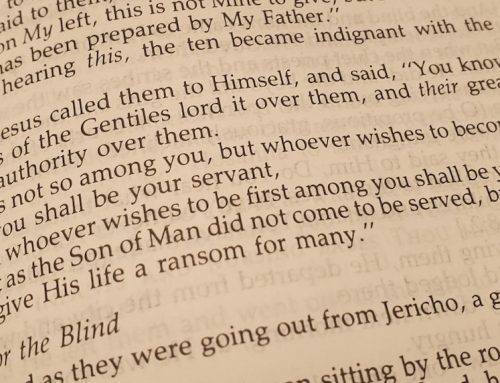Since May Week is legislating new rules for parents this year in order to crack down on teens and their texting habits (I’ve heard that they are, indeed, banning texting between teens interested in each other), I think it’s an appropriate time to write about the subject of rules-based parenting—and how that relates to legalism, Pharisaism, and our understanding of God as our father, and his grace. Have you thought about why the Old Testament comes with 613 rules from God for His people? And have you thought about why the New Testament wiped out such ordinances? Or why people constantly try to interpret the New Testament in such a way as to re-create an Old Testament style legal system?
The disparity in how God related to his people then vs. now, I believe, is because humanity was in a different moral era then than it is now. Humanity started with Adam and Eve. Think of society itself as a newborn infant, just starting out in the world and having to experience murder for the first time, as in the story of Cain and Abel. Humanity itself was in its intellectual and moral infancy at the beginning, and the Old Law was God’s way of teaching society more about his desires for how mankind lives.
The Old Law and all of its regulations was never intended to be the primary way God related to his people. It was always intended to just be a schoolmaster, or tutor for humanity—a means to teach mankind his moral expectations. Now, with His laws written on our hearts, we have little need of a written code of rules and regulations. I’ve raised a lot of kids and foster kids into adulthood, and I’ve said plenty of times “do I need to make a rule for that, or did you already know the right thing to do?” I suspect a few parents have said something similar. The truth is, kids wouldn’t need rules if they lived according to the The Greatest Commands at all times. But they don’t. And so we come along and have to make rules and assert authority to teach them the proper way to behave.
I have a confession. When our kids were young, my wife and I were the kind of parents who judged other parents when their kids were out of control in the store. We’d look down our noses at them, much like the Pharisees looked down their noses at the masses under their tutelage who didn’t follow the Law of Moses perfectly, and according to their superior instruction in the synagogues. But about the time our kids were into their teen years, we started to hit a brick wall. What we were doing before wasn’t working. And then it dawned on us. We were not acknowledging the developmental changes from child to adult, from fully under our authority, to an autonomous human being with free will. In the gray areas between those mile markers, we had not acknowledged that reality in our parenting style. That had to change.
We did an about-face. OK, not exactly a 180-degree turn-around in our parenting; we were still pretty conservative parents. We didn’t suddenly become permissive parents. But we certainly made a 180-degree turn in how we went about achieving our goals. We took on more of a mentoring role, We started allowing more autonomous decision-making, for better or for worse, with veto power, obviously, if the need arose to lay down the law.
When their decisions were not stellar, we allowed them to feel the consequences. If you think back to how you felt as a teen, if your parents protected you from any consequences from your bad decisions, you may have kept making them. And if your parents sheltered you from making any bad decisions, you may have suddenly decided to start trying them upon turning 18. Show of hands, anyone?
My point is that the rules-based parenting of our kids when they were younger and not as mature, is not unlike God’s rules-based parenting of mankind when it was younger and less mature back in Old Testament times. He imposed a lot of rules for a young humanity as it grew in maturity.
Likewise, God’s transition to a grace-based moral economy is not unlike our recognition that our kids needed to become adults, and learn from their own actions by feeling the consequences of their decisions. Let’s call that #adulting.
So how does this relate to Stanton and it’s May Week rulings, all the rules set by teachers in each congregation, and its authority wielded over the churches by its self-appointed overlords? Surely you can see the comparison. They are trying to parent the flock using rules and regulations for every possible behavior. Parents can’t make a judgment on whether their own teens are trustworthy enough to text each other. The church has to make a rule about it. Parents can’t make a decision about entertainment choices of their teens without getting counsel—i.e., a rule—about it.
Rules placed upon independent adults lead to rebellion. Relationship—coming alongside them—is called mentoring, and that’s a different method altogether of achieving reform. When you think about it, the only real way to successfully change someone from the inside out is to appeal to their desire to change so that they want to do it. Forcing change upon adults in the form of a rule may change the behavior (or at least make them work harder to not get caught), but it will leave the heart in rebellion, and that can be worse.
As an adult, I appreciate good mentors to help me grow. That’s iron sharpening iron. It’s also how God parents us, and how elders ought to be leading the flock. Oh, wait—Stanton doesn’t have elders yet after nearly half a century.






Agree! I definitely have felt the cringe when my kids were going from kids to teens. Seems like nothing works! But it's true: give them too many stiff rules and it just builds rebellion in them. Turns out it was decided that it was not good for boy/girl teens to be texting each other. I had this hard and fast rule myself when mine were 14-16. But then 17 hit and by then they figured out how to do it anyway. Thankfully, I found out and I actually allowed some of it (based on mercy, compassion, and good fruits of… Read more »
No deacons without elders is what the congregation I attended had come up with. Not sure if it was ever discussed at a May meeting. I had something interesting come up today after worship. I had questioned my baptism throughout my time spent in the group for nearly 20 years. Soon after baptism as well. Doubts would remain. I brought it up again in January that it was not good. I won't get into details however during counsel about it we all three preacher and teacher walked away that I was not a member though the teacher tried to manipulate… Read more »
Uh we just had a brother get re-baptized for the THIRD time within the last 6 months. And he was a preacher before! His daughter has also been baptized a couple times. I have NEVER heard that this would be brought up to the congregation. And I've witnessed quite a few re-baptisms! I don't know…I always thought the whole judgement in all this was messed up anyway. I mean, did that person NOT believe that Jesus Christ is the Son of God? It's not that complicated, in my opinion. Nothing against you, Craig, but what is your reasoning for questioning… Read more »
To be clear, the brother was baptized in the last 6 months for the third time. He'd been baptized a couple other times in the last 30 years or so.
@Seeking, this was my first thought as well—that they may want to reinstate Craig back so they can withdraw from him. It would be interesting to find out what their conclusion was on the "mark and avoid" thing. Because if they realized they can't take disciplinary action against a non-member, this may be their end-run around that—to just reinstate him as a member. It sounds convoluted, so hopefully, they're not as disingenuous as that. And yes, baptism is much simpler than SCOC would like everyone to believe. Thousands of people obeyed the gospel on the day of Pentecost in Acts… Read more »
I'm encouraged to hear that someone in the SCOC considered this blog to be full of "fair" words, even if they haven't yet seen that there are many solutions offered here. That's more of an admission than I've heard from anyone who is still "in" and defending the group. Solutions I've offered are: 1) Leave the SCOC and find a local church.2) Stay in the SCOC and be salt and light to those still there—but be aware you may be withdrawn from once it becomes clear you are not on board with their teachings and practices.3) Take the clean Bible… Read more »
To go along with my question above it was also said concerning my baptism whatsoever is bound on earth is bound in heaven.
Kevin, thank you for this! I agree with you whole-heartedly!
I do wish I would have realized this decades ago. I pray others learn this before it's too late. They are missing the greatest commandment in their own salvation and raising their children. Rules cannot replace LOVE!
Agree, Donna. Now that I've left the church, I am amazed at what a difference in meaning and intent "Work out YOUR OWN salvation" means.
That means no one else gets to work it out for you and tell you what to do in every aspect of your life!
Not only are the wicked miserable people, they love to spread their misery to others and even feed off of the misery of others. It is a fruit or behavioral characteristic of the wicked to always be unhappy and to desire others to be unhappy as well. This is thorny and thistles behavior. Christians are taught in 1 Thessalonians 5:16 to rejoice evermore; no matter how bad life seems we as Christians can take comfort in our God guiding and helping us in our time of need. The SCOC specializes in discouragement and tells stories of woe about members who… Read more »
I understand your point, and you're right—I just would caution against making broad generalizations as if they are all wicked, miserable people. They're not, there are some wonderful people in Stanton, no doubt.
I believe there are leaders, followers, and those who are trapped in their ranks by their own misinformed consciences.
I agree they are not all wicked people but the milieu control (social control) is done through the tales told of ex-members who fell into hard times, and the stories of doom and gloom that happen to those who were never Christians i.e. worldly people. While I do not believe the fantasy that false religion preaches about Christianity, how it is all love, joy, and prosperity neither do I believe the doom and gloom preached by the SCOC. Real Christianity is just like real life it has its ups and downs and its good times and it bad times, but… Read more »
Excellent, agreed.
This is a reply to the comment made by Seeking on May 7th at 10:54. You were surprised that a current member could be writing on this blog and not get in trouble or even withdrawn from…
The fact is that any current member that reads the blog is going against counsel and is not supposed to be reading it. They can't expose or rebuke Craig for writing on it because they would be exposing themselves for reading it.
Correct. I know for a fact that there are members who read the blog and will even give a tepid defense of the church in the comments from time to time. But they can't admit it openly. It's like the kid who tattles on his sibling for not closing his eyes during the prayer. 🙂
True, Anon and Kevin, but sometimes church leaders function much like a prosecutor. They'll settle for an informant to reel in the big fish!
Seeking 5:28 off the topic a little, preachers at least one I know of had no problem using me and another occasion my wife to go after another teacher in a class. He had no problem using me to go after another member who was an employee of his to question this member as we did personal work at least twice. He had no problem telling me to ask my wife a question or say this but don't tell her I told you to say it. Many other examples I could share. My point is how sneaky it is. Nothing… Read more »
I was never asked any of that…but I'm no good at keeping secrets so maybe that's why! HAHA
Funny I'm the one not to tell about a bday surprise party, lol, I'd spoil them at times.
Grace, now there is a word very seldom spoken in the scoc. Mercy, yes you hear the word mercy mentioned relatively often, but grace? Almost never. Something to ponder.
Agreed. And yet grace is a subject that should interest us greatly, since we could never earn the favor of a perfect God without it. We have to understand, embrace, and teach grace to teach Christianity. That doesn't mean a cheap grace where you can do anything and God will overlook it. But it does mean that we mortals could never earn the approval of an infinitely perfect God. Grace is a gift.
Our ladies class just started a study on Grace. I have been learning more than I ever did at the SCOC on God's grace. That word has such special meaning to me now!
DIY & Montessori & Waldorf inspired activities for kids, kids books & toys reviews and much more! read full review